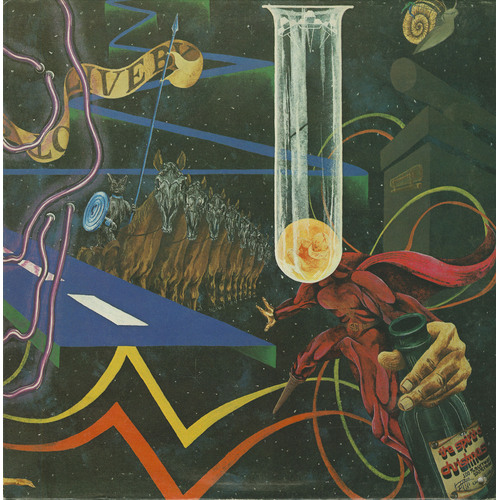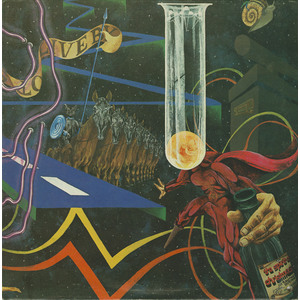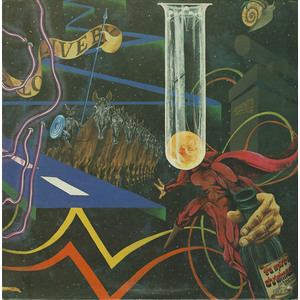Christmas (Spirit of)
Websites:
https://citizenfreak.com/artists/92995-christmas
Origin:
Oshawa, Ontario, 🇨🇦
Biography:
Christmas was never meant to follow the crowd. Formed in late 1969 in Oshawa, Ontario by songwriter and guitarist Bob Bryden, the band emerged from the ashes of cult psych outfit Reign Ghost with a bold mission: to create original, uncompromising music in a Canadian music landscape growing increasingly commercial. Bryden gathered five like-minded young musicians from the local scene — including guitar prodigy Robert Bulger, soulful bassist Tyler Raizenne, powerhouse drummer Helge “Rich” Richter, and expressive vocalists Gary Squires and Wolfgang Hryciuk — all united by a shared disdain for convention and a passion for boundary-pushing sound.
Originally dubbed The Society for the Year-Round Preservation of the Spirit of Christmas (a name as ambitious as their music), the band quickly shortened it to Christmas, though they never lost sight of the idealism and emotional honesty embedded in that original title. Rehearsing in a cold, abandoned Air Force barracks outside Oshawa, surrounded by rusting WWII relics, the group developed what they called “cosmic rock symphonies” — expansive, intense, and fiercely original compositions that fused psychedelic textures with progressive ambition.
Their first album came about almost by accident. While working on a budget cover project for Allied/Paragon Records, the producers encouraged the band to jam. The results were so compelling that the label scrapped the covers and issued the band’s improvisations and original songs instead. The result, Christmas (1970), was released without the group’s knowledge — but has since become one of the most sought-after Canadian psych albums of all time.
Shortly after, now pared down to a tight quartet, Christmas signed to Toronto’s Daffodil Records and recorded their first proper studio effort, Heritage, in just ten days at Toronto Sound. Released at the end of 1970, the album showcased a heavier, more focused direction, blending complex song structures with searing guitar work and a lyrical depth rare for musicians still in their teens. Though critically praised in some circles, Heritage failed to gain traction on mainstream radio, overshadowed in part by bigger releases like George Harrison’s All Things Must Pass, which dropped the very same day.
The following years were turbulent. A push by Daffodil for more commercial material led to a single written by Neil Sedaka — a move that alienated the band and clashed with their artistic goals. Despite label pressures, the group soldiered on, bringing in keyboardist and vocalist Preston Wynn and retreating to a rural barn to rehearse what would become their most ambitious album.
Recorded over the course of two years at Manta Sound Studios in Toronto, Lies to Live By (released in 1975 under the new name The Spirit of Christmas) was a towering progressive rock statement. With Mellotron, chamber orchestras, intricate arrangements, and thematic depth, it was unlike anything else released in Canada at the time. Though critics and prog fans responded with awe, the album was released into a changing industry with little support. Daffodil Records folded soon after, and with it, the band's momentum came to a halt.
In the decades since, the legacy of Christmas / The Spirit of Christmas has grown steadily. Their albums — once overlooked — are now celebrated as pioneering works in Canadian underground music. Both Heritage and Lies to Live By are revered by collectors and psych/prog aficionados alike, admired for their audacity, emotional depth, and refusal to compromise.
Though they never found commercial success, the band’s spirit endured. Through reunions, tribute performances, and a growing international fanbase, the music of Christmas continues to resonate with listeners looking for something more — something honest, strange, and timeless.
After all, the spirit of Christmas was never just a name. It was a philosophy. A sound. A feeling. And for those who’ve heard it, it’s never been forgotten.
-Robert Williston
Original Lineup (1969–1970)
(from the formation through the first Christmas album on Paragon)
Bob Bryden: guitar, vocals, keyboards
Robert Bulger: lead guitar
Tyler Raizenne: bass
Rich (Helge) Richter: drums
Gary Squires: vocals
Wolfgang Michael Hryciuk: vocals, tambourine
Daffodil Lineup (1970–1971)
(Heritage era — after Gary Squires and Hryciuk departed)
Bob Bryden: guitar, vocals, piano, organ, harpsichord, electric harpsichord, celeste, effects
Robert Bulger: guitar
Tyler Raizenne: bass, electric zombie
Rich (Helge) Richter: drums, embryonic whimper
Expanded Lineup (1973–1975)
(Lies to Live By era – now called The Spirit of Christmas)
Bob Bryden: guitar, vocals, keyboards
Robert Bulger: lead guitar
Tyler Raizenne: bass
Helge Richter: drums
Preston Wynn: lead vocals, guitar, keyboards
Live at Massey Hall Lineup (Sept. 23, 1971 concert)
(recorded for the Live at Massey Hall 1989 LP)
Bob Bryden: guitar, vocals
Robert Bulger: lead guitar
Tyler Raizenne: bass
Rich (Helge) Richter: drums
Lynda Squires: vocals (guest, ex-Reign Ghost)



